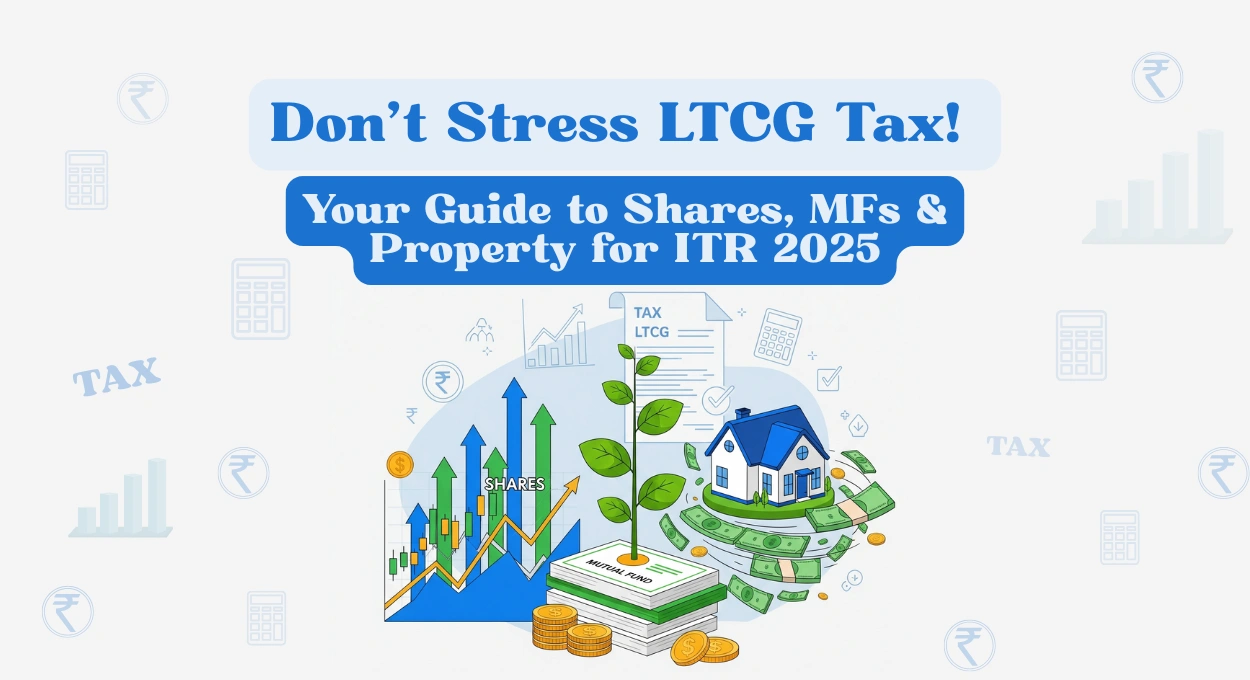Your Easy Guide to LTCG Tax on Shares, Mutual Funds, and Property for ITR 2025
Sold some stocks, equity mutual funds, or a property in 2024? Then you’ll need to tackle Long-Term Capital Gains (LTCG) tax for your Income Tax Return (ITR) due by September 15, 2025 for FY 2024-25 (AY 2025-26). Don’t stress—this guide breaks down the LTCG tax rules for equity shares, equity mutual funds, and property in simple, way with examples and tables to make it super clear. Let’s get you ready to file like a pro!
What’s LTCG Tax All About?
LTCG tax kicks in when you make a profit from selling a long-term capital asset—think stocks, mutual funds, or property you’ve held for a while. The “long-term” part depends on how long you’ve owned the asset:
- Equity shares and equity mutual funds: Held for over 12 months.
- Property (land or building): Held for over 24 months.
Other assets like listed debentures, government securities, UTI units, and zero-coupon bonds also qualify as long-term after 12 months. If you sold shares before July 10, 2014, they don’t need to be listed to count. Got it? Now let’s talk about how these gains are taxed.
LTCG Tax Rates for Shares and Equity Mutual Funds
For equity shares (listed), equity-oriented mutual funds, and business trust units, LTCG tax falls under Section 112A. The tax rate depends on when you sold the asset:
- Sold on or before July 22, 2024: Pay 10% on gains above ₹1.25 lakh.
- Sold on or after July 23, 2024: Pay 12.5% on gains above ₹1.25 lakh.
Catch: The Securities Transaction Tax (STT) must be paid when you sell (and for shares, when you bought them, with some exceptions). That ₹1.25 lakh exemption means you only pay tax on gains above that amount.
Example: Priya sold equity shares in August 2024 for a ₹2 lakh gain. After the ₹1.25 lakh exemption, she pays 12.5% on ₹75,000, which is ₹9,375 in tax.
Also Read :- Smart Tax Planning: Maximize 80C & 80D Benefits to Stay Clear of IT Notices
Special Rule for Shares Bought Before February 1, 2018
If you bought listed equity shares before February 1, 2018, the cost of acquisition is the higher of:
- Your actual purchase price.
- The lower of:
- Fair Market Value (FMV) on January 31, 2018 (highest stock price that day or the last trading day before).
- The sale price.
For unlisted units, use the Net Asset Value (NAV) on January 31, 2018. If shares were unlisted on January 31, 2018, but listed when sold, adjust the cost using the Cost Inflation Index (CII) for FY 2017-18.
Example: Rohan bought shares in 2016 for ₹50,000. On January 31, 2018, their FMV was ₹80,000. He sold them in 2024 for ₹1 lakh. His cost is ₹80,000 (higher than ₹50,000, lower than ₹1 lakh), so his gain is ₹20,000. No tax since it’s below ₹1.25 lakh!
LTCG Tax Rates for Property
For land or buildings, the tax rules depend on when you bought and sold the property, with a holding period of over 24 months:
- Bought before July 23, 2024:
- Pay 20% with indexation or 12.5% without indexation—whichever is lower (only for resident individuals or HUFs, thanks to the grandfathering provision).
- Bought on or after July 23, 2024:
- Pay 12.5% without indexation.
What’s Indexation?
Indexation adjusts your purchase price for inflation, lowering your taxable gain. You use the Cost Inflation Index (CII), set by the government. The formula is:
- Indexed Cost of Acquisition = Purchase Price × (CII of sale year ÷ CII of purchase year)
- Indexed Cost of Improvement = Improvement Cost × (CII of sale year ÷ CII of improvement year)
For ITR 2025, indexation applies only to property bought before July 23, 2024, letting you choose between 20% with indexation or 12.5% without.
Example: Anu bought a house in 2018 for ₹40 lakh (CII: 280). She sold it in August 2024 for ₹70 lakh (CII: 363), with ₹1 lakh in transfer costs.
- Indexed Cost: ₹40 lakh × (363 ÷ 280) = ₹51.86 lakh
- Gain with Indexation: ₹70 lakh – ₹1 lakh – ₹51.86 lakh = ₹17.14 lakh
- Tax Options:
- 20% of ₹17.14 lakh = ₹3.43 lakh
- 12.5% of (₹70 lakh – ₹1 lakh – ₹40 lakh) = ₹3.63 lakh
- She picks ₹3.43 lakh (20% with indexation, lower due to grandfathering).
What’s the Grandfathering Provision?
For resident individuals or HUFs selling property bought before July 23, 2024, the grandfathering provision lets you pay the lower of the two tax options (20% with indexation or 12.5% without). It’s like a safety net to keep your tax bill fair.
Also Read :- New Tax Regime 2025: 3 Section 80C Investments That Still Deliver Value
LTCG Tax Rates at a Glance
Here’s a quick table to sum up the tax rates:
| Asset Type | Acquisition Date | Sale Date | Holding Period | Tax Rate | Exemption Threshold | Indexation | Key Notes |
|---|---|---|---|---|---|---|---|
| Equity Shares (Listed) | Before July 23, 2024 | On/Before July 22, 2024 | >12 months | 10% (above ₹1.25 lakh) | ₹1.25 lakh | No | Old rule; STT required. |
| Equity Mutual Funds | Before July 23, 2024 | On/Before July 22, 2024 | >12 months | 10% (above ₹1.25 lakh) | ₹1.25 lakh | No | Old rule; equity-oriented funds. |
| Equity Shares (Listed) | Any | On/After July 23, 2024 | >12 months | 12.5% (above ₹1.25 lakh) | ₹1.25 lakh | No | New rule; STT required. |
| Equity Mutual Funds | Any | On/After July 23, 2024 | >12 months | 12.5% (above ₹1.25 lakh) | ₹1.25 lakh | No | New rule; all holdings. |
| Property (Land/Building) | Before July 23, 2024 | On/Before July 22, 2024 | >24 months | 20% (with indexation) | None | Yes | Applies to pre-July 2024 sales. |
| Property (Land/Building) | Before July 23, 2024 | On/After July 23, 2024 | >24 months | 12.5% (no indexation) OR 20% (with indexation) | None | No/Yes | Choose lower tax (grandfathering for residents). |
| Property (Land/Building) | After July 23, 2024 | On/After July 23, 2024 | >24 months | 12.5% (no indexation) | None | No | New rule; no indexation. |
Can You Use the Basic Exemption Limit?
If you’re a resident individual, you can offset LTCG against the basic exemption limit (e.g., ₹2.5 lakh for FY 2024-25) after accounting for other income. For example, if your other income is ₹1.5 lakh, you can use the remaining ₹1 lakh to reduce your LTCG. NRIs don’t get this perk.
Example: Vikram’s total income is ₹2 lakh, and his LTCG is ₹1 lakh. He uses ₹2 lakh of his ₹2.5 lakh exemption limit, leaving ₹0.5 lakh to offset his LTCG. His taxable LTCG is ₹0.5 lakh, taxed at 12.5% (₹6,250).
Also Read :- ITR Filing AY 2025-26: Your Easy Guide to Mutual Fund Taxes in FY 2024-25
How to Calculate LTCG
Use this table to crunch the numbers (works great in Excel):
| Particulars | Amount (₹) |
|---|---|
| Sale price of the asset | XXXXX |
| Less: Transfer expenses (brokerage, commission) | (XXXXX) |
| Net Sale Consideration | XXXXX |
| Less: Indexed cost of acquisition (*) | (XXXXX) |
| Less: Indexed cost of improvement (*) | (XXXXX) |
| Long-Term Capital Gains | XXXXX |
*Note: Indexation applies only to property with the benefit available.
Example: Sameer sold shares for ₹3 lakh, with ₹10,000 in brokerage. He bought them for ₹1.5 lakh. His LTCG is ₹3 lakh – ₹10,000 – ₹1.5 lakh = ₹1.4 lakh. After the ₹1.25 lakh exemption, he pays 12.5% on ₹15,000 = ₹1,875 tax.
Tips for ITR Filing 2025
- Gather Documents: Keep purchase/sale receipts, STT proofs, and CII tables ready.
- Check Dates: Confirm acquisition and sale dates to apply the right tax rate.
- Use the Right Form: Report LTCG in Schedule CG of ITR-2 or ITR-3.
- Get Help if Needed: Complex sales? A tax pro can save you time and money.
Wrapping It Up
Filing your ITR for 2025 doesn’t have to be a headache! Whether you’re selling stocks, mutual funds, or property, understanding LTCG tax rules can save you from surprises. With 12.5% rates for shares and funds post-July 2024, indexation options for pre-2024 property, and handy exemptions, you’re set to tackle your taxes like a pro. Start early, double-check your calculations, and maybe chat with a tax advisor for peace of mind. Here’s to a smooth ITR filing season!
FAQs (Frequently Asked Questions)
- What’s the LTCG tax rate for shares sold in 2025?
For sales on or after July 23, 2024, it’s 12.5% on gains above ₹1.25 lakh, if STT is paid. - Can I use indexation for property in ITR 2025?
Yes, for property bought before July 23, 2024, you can choose 20% with indexation or 12.5% without (residents only). - What’s the grandfathering provision for property?
Residents selling property bought before July 23, 2024, pay the lower of 20% with indexation or 12.5% without. - How do I calculate LTCG for old shares?
For shares bought before February 1, 2018, use the higher of actual cost or the lower of FMV (January 31, 2018) and sale price. - Can NRIs offset LTCG against the basic exemption limit?
No, only resident individuals can use the basic exemption limit to reduce LTCG after other income.

